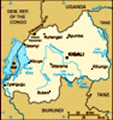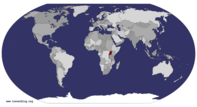Advertisement
So, I have been here for a month now, and I have had some great experiences. And so far (terribly sorry) I haven't mentioned one of them...well, maybe the one about going to the village, but I didn't give much detail.
Rwanda. Synonyms: War, hate, genocide, strife, 1994???? No. Not at all.
I have to admit that for a very long time, that is how I have though of Rwanda. I have read several books about it, including
Shake Hand With the Devil by Lt. Gen. Romeo Dallaire. I even met Gen. Dallaire and talked with him (briefly). And so I thought that I knew what Rwanda was about. I thought I knew what I was going into (though I knew that it wouldn't be as bad, since it has been 13 yrs since the internationally covered "genocide"). I had no idea what I was going into.
Rwanda. Synonyms: order, peace, rebuilding, moving on, unity, struggle
That's more like it.
I have spent a month here now, traveled to several villages, gone all around the capital city of Kigali and seen everything that there is to see in the district of Gatenga where

 Inter-cropping
Inter-cropping
Bananas and sorghum, I believe. I am not an agriculture expert.I live. So far, I have seen one piece of evidence that the war in 1994 actually happened. One.
Down the hill from the house where I live, right beside the main road through Gatenga, there in a memorial graveyard where some 3000 people are buried. I am not attaching a photo, nor have I taken one, and nor will I, until I find out what the customs with graves and memorials are here. But it is a beautiful place. There is a large statue (of what, I dont know because it is still covered with a tarp), and the base of it (which is visible) has the names of all 3000 people carved on it. It is neat, well kept and dignified. But this memorial is the only thing that I have seen which tells me that the war ever happened.
The only other evidence is the stories that I have heard. Most of them are terrible and sad, but many of them also involve bravery and love, neighbors helping each other and taking in the children of people who have been killed. There is a girl who lives near me who has told me her story

 Beans
Beans
Good for replenishing soil nutrients.from 1994. Her mother was a Tutsi, her father a Hutu and she and her five sisters were considered Hutus. The inter-tribal marriage of her parents proved to be a problem, as the Hutus saw her father as a traitor for marrying a Tutsi, and the Tutsis saw her mother as a traitor for marrying a Hutu. In the end, both of her parents and two of her sisters were killed, as well as two uncles and an aunt. So this nice girl (who is now 18) had to raise herself and her 3 remaining sisters, with help from some neighbors. It is a sad story, but a common one. All around the country people have come together to help each other bring themselves and their country out of one of the most horrific wars of the 20th century. It may sound terrible for me to say this, but in a way, the war of 1994 helped Rwanda, as it brought the survivors together. Regardless of race or tribe, wealth, status prior to the war or any other dividing factor, they came together and helped each other.
And this unity is still very existent today. I have yet to

 The Clinic
The Clinic
The clinic (right) and the house of a few workers (left) as seen from the roof of the Anderson's house.see anyone shunned because they are Hutu or Tutsi, I have yet to see any distinction between the two people. In fact, the only way to find out which tribe someone belongs to is to ask them, and I dont do that because it is divisive. Rwanda is a country reborn. It has rebuilt itself, it has an excellent infrastructure, education system and health care system (for a poor African nation). It is the most developed and controlled country that I have seen so far in Africa (excluding South Africa, which is basically a fully developed nation on par with Europe and North America in many ways). And the development and reconstruction and forward-moving-past-forgiving mentality continue. But, as always, there are still difficulties.
The main difficulty that I have noticed so far is the population density. Rwanda is, for lack of a better word, tiny. Miniscule, petite, grain-of-sand-on-the-beach, hard-to-find-on-a-map kind of tiny. For the Albertans reading this, this might help. Rwanda fits in Alberta three times over, with wiggle room. And has a population four times that of Alberta (8-9 million to Alberta's 2ish million). The population density is high. Not a huge problem....except when you think of the fact that it is all hills. There is very little flat spaces in Rwanda, and most of them are the spots where lakes are. So how do you feed millions of people in a tiny country with almost no flat, tillable land? You grow stuff on the hills. The terracing that you see here is amazing. Every side of every hill is used for agriculture. Irrigation is mostly through canals in the hills (conveniently gravity-driven) in the rainy season (right now) and use of buckets and jerry-cans during the dry months (I think...the only farmers I have talked to didnt really speak French, so communication was a problem).
The people here are also very knowledgeable about agriculture and soil nutrients and so on. I took an agriculture class in grade 8 (while living in Zambia with my family), and though I hated it, didn't want to learn it and didnt pay attention, one thing, one concept stuck with me. Dont drain your soil. Do not over use it and grow the same thing over and over and over, or the soil will lose all its nutrients and will be useless. Unfortunately, this happens alot with uneducated farmers. In Zambia, the main crop (nearly the only crop) grown is Maize (somewhat like corn, but white and not sweet). Maize is a crop that drains nutrients from the soil and needs a lot of water. So in Zambia, a drought prone country, the idea of growing maize and only maize is kinda dumb. Every time there was a drought there was starvation because the maize harvest was destroyed. Plus, maize doesn't have a lot of nutrients, and what little it has would be boiled out when they made nshima (the main dish in Zambia, made of maize flour boiled in water until is became a thick paste, then eaten with fried vegetables or meat). And since most of the farmers in Zambia just grew maize, eventually the soil would be drained of its nutrients, and they would have to go hunting for new land to cultivate.
Not so in Rwanda. During my activities with Engineers Without Borders in Canada, I learned about a crop called sorghum that EWB is trying to encourage Zambian farmers to grow. It is drought-resistant, has more nutrients and does not drain the soil as badly as maize. If I got any of that wrong, I'm sure my brother Daniel (who worked in Zambia with EWB) will post a comment correcting me. Point being, sorghum good, maize not so good. So I was very surprised, and happy, when I discovered that here in Rwanda, they grow more sorghum than maize. Also, they rotate their crops (grow different things on their land each year) which helps prevent draining nutrients from the soil, and they grow different crops together (ie what may look like a field of banana trees from a distance turns out to be a field of banana trees with sorghum or beans or something planted in between the trees). If the crops being grown together are chosen and matched properly, this also prevents nutrient draining. Very funky agricultural techniques that I didn't see in Zambia.
When you put the agricultural know-how together with the amazing terracing and the healthy rains (due to the altitude), you get a country, however small, that produces enough produce to feed the whole nation plus the greedy, fat muzungus (sorry, had to say it!), and then have some bananas left over for export. Awesome.
Another awesome thing that I have seen (and had the opportunity to help with) is the clinic in Gatenga that was recently finished (to a functional level...still some work going on). Yes, this is going to be blatant advertising for the Anderson Association. See www.andersonassociation.com.
The Anderson's, as I've mentioned early on in my blog (first or second post...or both) are a family who lived here for 10 or so years, beginning in 1994 or '95, and who own a 4 1/2 hectare parcel of land not to for from Kigali. This is where I live. On this land they have (with much help from workers here and financial contributors in Canada, the US and other places) built a clinic that is open 24/7, available to anyone who shows up, and I think its free but Im not sure. If it isnt free its cheap. Every day anywhere from 5 to 30 people come through the clinic and are treated by one of the two health-care workers to run the clinic, or by one of the doctors who come every once in a while for a few hours. If they cant be treated, they are sent to one of the hospitals in Kigali, which they can reach by bus or taxi. It is well equipped (considering size and location) with a consultation room, observation room/sick ward, and a room with a bed that I am sure is for child birth, though I have not seen it used, so I am guessing. It also has a lab with microscopes and doohickeys (I am not medical expert, folks), and all the walls are plastered with posters telling people how to maintain basic sanitation and health at home. Oh yeah, and it has a very sizable cabinet in the consultation room (slash office) full of various drugs and medications. However, work continues on it, and it could be better. For example, the Anderson Association is trying to buy a nice shiny Land Cruiser to use as an ambulance. Again, visit www.andersonassociation.com for more details, pictures, and a chance to donate some money if you are feeling generous.
To wrap things up, I will say that Rwanda has entered a new era, one separate and uncaring of what happened in 1994 and before that, unhindered by negative international influences, and steaming full-ahead towards a more prosperous, more influential, if still incredibly tiny, Rwanda.
I love this place.
Advertisement
Tot: 0.206s; Tpl: 0.017s; cc: 5; qc: 51; dbt: 0.1093s; 1; m:domysql w:travelblog (10.17.0.13); sld: 1;
; mem: 1.2mb











Mark Baker
non-member comment
Farmer Kevin
Dear Kevin. Thanks for you nice long blog entry and photos. I didn't know you were so agricultural. Be nice to have more pictures of you (only one so far). You have a nice positive outlook on Rwanda which is good for people to hear because sometimes the media only shows the bad aspects of Africa or when a movie star buys a baby. The Anderson's aren't movie stars, but they are doing good work there. Obviously not all non-Africans are fat and greedy. It's amazing to think so many people can subsist off of so little land. Mind you, compared to Rwanda, Alberta only gets 3 month growing season. We live off of oil instead of sorgum. Keep on blogging! ...Daddy